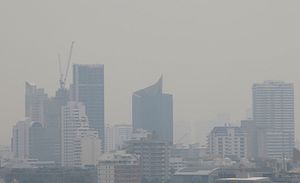A fleet of drones, trucks, and small planes sprayed water to try to reduce air pollution around Bangkok on Thursday while the city’s governor invited critics to brainstorm better ideas to improve the air quality in the Thai capital.
Unhealthy pollution levels forced city schools to close Wednesday for the rest of week, and the Public Health Ministry advised against outdoor activities.
Faced with public discontent as well as a possible health crisis, Bangkok’s governor, Police General Asawin Kwanmuang, has declared the city a “pollution control zone,” allowing firmer measures such as road closings and limits on diesel exhaust, outdoor burning and construction activities.
Prime Minister Prayut Chan-o-cha ordered inspections of factories to measure the pollution they are emitting. But he warned that implementing radical solutions could cause inconveniences that people might be unwilling to accept.
“To ban vehicles or to ban vehicles on odd and even dates, will people accept that?” he said. “If we provide [more public] transportation, will people use it?”
Even long-term measures raise questions, he said. “At the moment, we can improve the efficiency of cars and convert buses to use NGV gas. Are we ready to spend the budget for whatever it will cost?”
The measures proposed this week would focus on what are generally considered the main sources of Bangkok’s air pollution, particularly vehicle exhaust, especially from diesel engines. Open burning and emissions from factories and power plants also are major problems, along with dust from construction sites.
Some scientists have speculated that smoke and haze from Thailand’s less-developed eastern neighbor, Cambodia, also drifted into Bangkok, stirring up a bit of eco-nationalism, but the government’s Pollution Control Department said evidence did not support this theory. Parts of northern Thailand, however, do suffer an annual air pollution crisis due to fires from slash and burn agriculture and other causes in remote rural areas and in another neighbor, Myanmar.
In Bangkok, the crisis-level pollution, along with public awareness, has been spurred by meteorological events that trap the noxious pollution. These include a thermal inversion, which keeps the dangerous particles closer to the ground, and weak winds, which fail to blow them away.
Asawin acknowledged that drones aren’t a long-term solution but said he thinks every bit of effort helps. At a news conference, he said critics calling the drones a meaningless stunt would otherwise criticize him for doing nothing.
Asawin invited private-sector experts and academics to share ideas to improve air quality.
“Those who are knowledgeable on this issue, don’t give opinions to others, tell me. I am the one who is working on the issue, please give me advice,” he said. “Do I know everything? No, I don’t. Because I do not know everything, that’s why I will hold a meeting [Thursday]. Please join us in brainstorming.”
Critics say the authorities’ attempt to combat pollution by using drones to spray water is ineffective.
The director of Greenpeace Thailand, Tara Buakumsri, said at best, the attempt will have a psychological impact on city dwellers, but it won’t improve air quality. Tara said the government should determine the sources of the pollution and come up with long-term strategies to reduce emissions from those sources.
Police announced Thursday that they have arrested the operator of a website that falsely claimed that a woman had died as a result of tiny PM2.5 particulate matter that experts say is one of the most dangerous constituents of air pollution because it can penetrate deep into the lungs. A photo of a woman whose skin was swollen accompanied an article on the man’s website.
The man was arrested Sunday and charged with violating the Computer Crime Act by uploading false information that could alarm the public. The offense is punishable by up to five years in prison. Police said they are trying to track the operators of two other websites that published the same article, and have asked government telecommunications authorities to block them.
By Tassanee Vejpongsa for Associated Press.

































